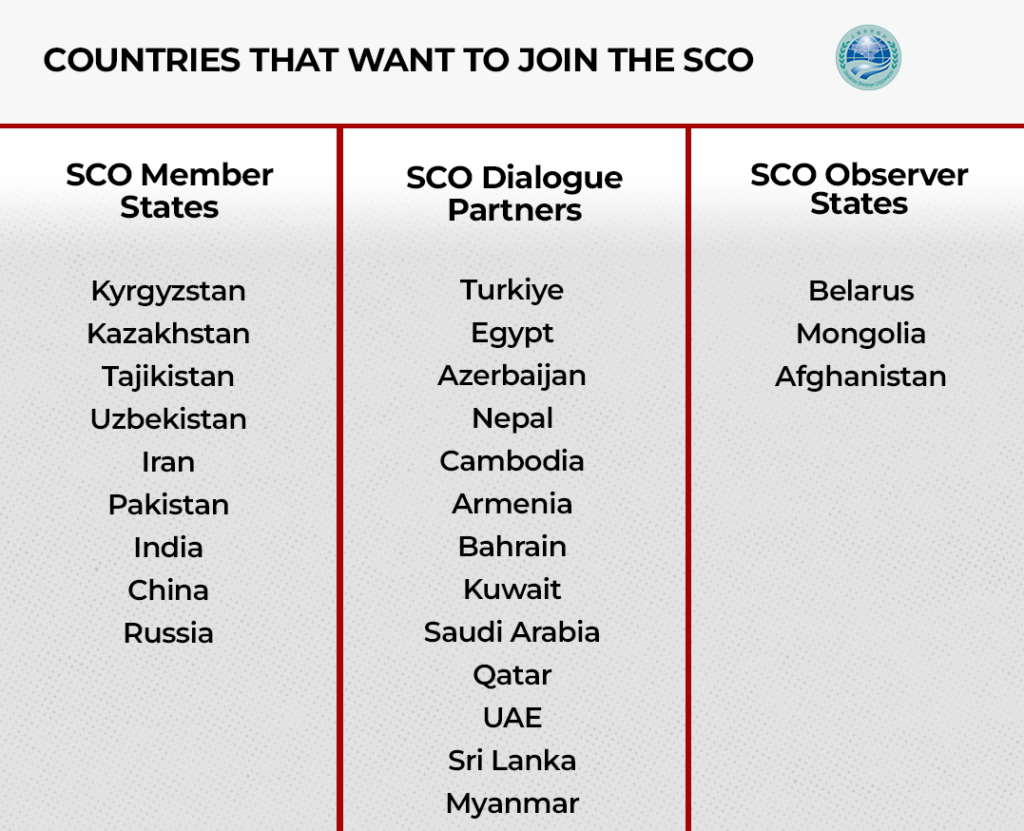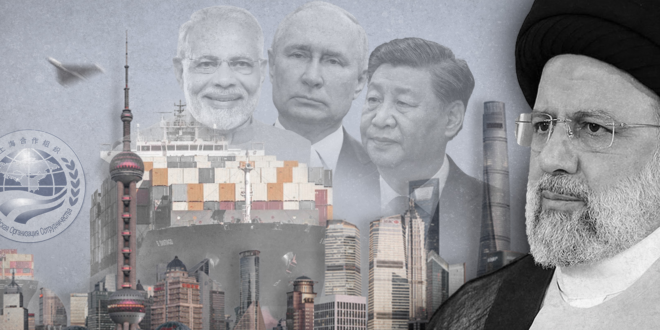With Iran’s SCO veto, no other West Asian country can join the eastern security and economic alliance without Tehran’s say-so. This is a remarkable position of leverage for the Iranians, who have overnight gained access to a $6 trillion marketplace and military cooperation with Asia’s biggest powers.
After a long-awaited 15-year process, Iran finally achieved a significant milestone on 4 July: full membership in the prestigious Shanghai Cooperation Organization (SCO), the east’s preeminent security alliance.
This landmark event not only marked Iran as the first West Asian nation to join this powerful Asian grouping dedicated to security, economic, and humanitarian cooperation, but it also solidified the SCO’s standing with a formidable line-up of members including China, India, Tajikistan, Kazakhstan, Uzbekistan, Kyrgyzstan, Russia, Pakistan, and now Iran.
This accomplishment reflects a resounding failure of the US’s strategy to isolate its adversaries through the imposition of unilateral economic punishments, or “sanctions.” The SCO, in stark contrast to the west, no longer recognizes these unilateral measures as legitimate obstacles and chooses instead to only uphold the legally binding UN Security Council decisions.
The futility of Atlanticist attempts to isolate Tehran becomes apparent when one considers the staggering number of 4,540 unilateral economic measures imposed by the west on Iran, all aimed at isolating the Islamic Republic.

Failure of US sanctions
These measures, which have been in effect since President Jimmy Carter’s Executive Order 12170 froze approximately $12 billion of Iranian assets on 14 November, 1979, have failed to achieve their intended goal of obstructing international cooperation with Iran.
In fact, it could be argued that the US inadvertently thwarted its own ambitions. By indiscriminately imposing sanctions on various countries, Washington has instead found itself increasingly isolated. This was even acknowledged by US Treasury Secretary Janet Yellen who warned in April that:
“There is a risk when we use financial sanctions that are linked to the role of the dollar that over time it could undermine the hegemony of the dollar… Of course, it does create a desire on the part of China, of Russia, of Iran to find an alternative.”
Presently, five SCO permanent members out of nine are currently subject to US sanctions or have experienced their impact in the past: Iran, Russia, China, India, and Pakistan.
The remaining three members have been indirectly affected by the west’s unilateral actions, making their collaboration essential in mitigating the damage caused by these punitive measures. The futile objective of isolating states that clash with Washington’s interests has clearly backfired, as the SCO continues to strengthen the bonds between these countries.
Iran: Shanghai’s gateway to West Asia
One of the primary objectives of the SCO is to enhance economic cooperation between member states, which holds immense potential for the once-isolated Iran. Joining this bloc provides the Iranians with a gateway to Central Asian markets, opening up opportunities worth billions of dollars. In September 2022, Mehdi Safari, Iran’s deputy foreign minister for economic diplomacy, aptly described this accession as a promising opportunity for flourishing business and trade.
The SCO’s influence on global trade has been increasing since its inception in 2001, with its share of world trade rising from 5.4 percent in 2001 to 17.5 percent in 2020, according to Chinese customs data. Even more dramatic, the value of global trade of SCO member countries grew from just $667 billion in 2001 to $6.06 trillion in 2020.
Undoubtedly, the escalating great-power competition between China, Russia, and the US has played a pivotal role in expediting Iran’s accession to the SCO.
Russia’s preoccupation with the war in Ukraine and China’s escalating competition have motivated these two countries to bolster their relations, including with states seeking to escape US political and financial hegemony, and are receptive to collaboration. Even US-friendly states today have valid economic reasons to resist western pressures that aim to restrict their cooperation with Beijing and Moscow.
The US, perceiving the SCO as a hostile bloc led by China and Russia that challenges its post-Cold War global dominance, underscores the significance of Iran becoming the first West Asian country to join an organization led by these two powers.
This development is poised to inspire other regional countries to follow suit, whether to secure a position alongside rising powers or to ensure that West Asian representation in the organization remains diverse and inclusive.
Today, the geopolitical competition between China, the US, and Russia extends beyond a singular geographical arena, encompassing a battle for influence and the shaping of the new world order in all continents. As rising powers and their organizations seek to expand their spheres of influence, Iran’s presence in the SCO becomes a crucial incentive to foster increased cooperation with West Asia.
By attaining permanent membership in the organization, Iran now has reach to approximately 40 percent of the world’s population and 30 percent of global economic output – access which it can funnel to West Asia.
Moreover, the SCO represents roughly 60 percent of Eurasia’s population. Considering the trajectory of economic relations among SCO member states since the organization’s establishment in 2001, Iran is poised to become a gateway for attracting billions of dollars’ worth of projects to West Asia, particularly those that contribute to East Asia’s growth.
SCO’s collective security
Iran’s full membership in the SCO also impacts its regional and Eurasian security clout, especially given the organization’s three key security objectives: combating terrorism, separatist projects, and extremism, as outlined in Article 1, Section 3 of the SCO Charter.
Iran has demonstrated its capability and determination in countering terrorism within its borders, extending its security measures to neighboring countries, and directly confronting terrorist groups beyond its borders.
Tehran’s cooperation with the governments in Damascus and Baghdad to counter terrorism in those countries, and its success in defeating ISIS and other terrorist groups, are an indication of the effectiveness of Iran’s military and political forces in establishing security in the region.
Iran’s accession to the SCO can therefore enhance the collective ability of member states to combat terrorist activities across the vast areas covered by the organization. During his address to the 23rd Council of Heads of State of the SCO, which coincided with Iran officially joining the bloc, Iranian President Ebrahim Raisi emphasized Iran’s readiness to share its experience and capabilities within the SCO mechanisms, aiming for a region free from terrorism, extremism, and separatism.
Iran’s inclusion in the SCO Regional Anti-Terrorism Structure, formed under Article 10 of the SCO Charter, strengthens its security and military cooperation against terrorism, extremism, arms smuggling, and cyber threats.
Iran’s SCO membership also allows participation in joint military exercises, such as the “Peace Mission Exercise,” fostering defense ties with Central Asia, Russia, and China. This could facilitate Iran’s expanded arms exports, particularly in the field of drones, to Central Asian nations.
Following Iran’s admission into the SCO, an article in the Jerusalem Post noted that “a growing concern is spreading across the western world, primarily due to the multifaceted implications of Iran’s growing military ties with Russia and China.”
As UNSC restrictions on Iranian ballistic missile transfers expire in October, Iran will gain even more freedom in arms trade with SCO members, a source of extreme apprehension for Atlanticists.
Tehran as gatekeeper to West Asia
In accordance with Article 16 of the SCO charter, the accession of a new member to the bloc requires unanimous agreement among all permanent members, granting each of these members full veto power. In the past, Iran’s application for membership faced delay due to Tajikistan’s opposition, stemming from allegations that Iran sent fighters into the country’s civil war in the 1990s. Those issues have been fully resolved, hence Iran’s recent accession to full membership.
West Asian countries are increasingly aspiring to join organizations led by Beijing and Moscow, such as the BRICS and the SCO, each driven by different motivations. Their objectives include challenging Iran’s exclusive inclusion in these groups, fostering stronger economic cooperation with Asian powers, enhancing defense collaborations, or establishing a counterbalance to western organizations.
Currently, the SCO includes six West Asian countries as dialogue members: Saudi Arabia, the UAE, Qatar, Kuwait, Bahrain, and Turkiye, alongside Egypt from North Africa. Consequently, the transition to permanent membership for these countries requires Iran’s consent, potentially granting Iran leverage in its relations with its regional rivals. This powerful status is one that Moscow and Beijing would not have failed to calculate when designating Iran as the SCO’s first West Asian permanent member.
Iran’s induction as a permanent member of the SCO marks a significant triumph in the Islamic Republic’s foreign policy endeavors, enhancing prospects for defense, economic, and humanitarian cooperation between Iran and influential Asian powers.
Iran’s geostrategic influence
Iran’s presence within an organization led by China and Russia also helps these powers further fortify their presence in West Asia, thus bolstering their geostrategic equilibrium vis-à-vis the US in the region.
Undoubtedly, the Israeli occupation state stands among the most apprehensive parties regarding Iran’s permanent membership, concerns that stem from the potential avenues it opens for Iranian defense and military collaboration.
Additionally, Iran’s lasting inclusion in the SCO might serve as an incentive for its regional rivals to seek representation at the Shanghai table, fearing a new asymmetry in West Asia’s internal power balance. Consequently, Iran’s veto power within the SCO becomes a strategic card that can be utilized to assert its influence and impact the behaviors of other nations aiming to join Asia’s economic-security powerhouse.
 Eurasia Press & News
Eurasia Press & News




